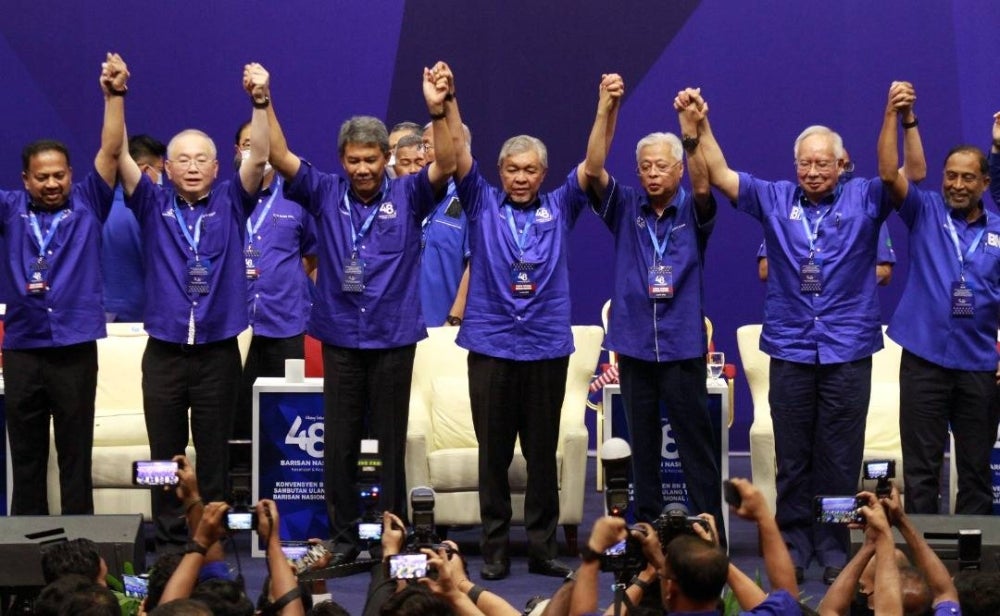Backwards to Zahid’s “Old Malaysia”, or forwards to a better Malaysia?

Umno president Datuk Seri Zahid Hamidi argued the following three points at Barisan Nasional’s 48th national convention:
That Malaysia is in turmoil because Pakatan Harapan destroyed the “Original Malaysia” (“Malaysia Asal”) formula.
That PH’s attempt to replace it with some sort of “New Malaysia” completely failed.
And that what Malaysia really needs right now is to go back to the glory days of the “Original Malaysia” formula.
I only agree with one of the three points above.
Listening to Zahid’s reasoning, it’s impossible not to think of Donald Trump’s famous slogan: Make America Great Again.
This is a tried and tested political strategy - appeal to the nostalgia of some imagined golden glory days of the past, blame others for ruining those days, and promise that you are the ones to ‘bring back’ that glory.
So what are the main characteristics of this “Original Malaysia” that Zahid is referring to?
My reading is that he is referring primarily to the essence of the BN political formula, which I would describe as: one very dominant Malay-only party at the centre of a political coalition, which is made out of one main political party for each major race in Malaysia.
This one to one relationship is defined mainly by the Malays, Chinese, and Indians having one ethnically-exclusive party each.
Sabah and Sarawak have always had their own rather unique political dynamics, but in the old formula, there was usually still one or two main dominant BN component parties for each East Malaysian state.
The idea that Zahid is pushing, which is likely to be the central thrust of BN’s political strategy in GE15 is simple: “This is the only formula that has ever worked in Malaysia, and when you the voters tried something different, look at all the chaos that resulted”.
As someone who works in political communication, I’ll be the first to admit:
This is a compelling, effective argument - not least because it is simple and easy to understand.
Quite frankly, if I were working for BN (dream on), this is exactly the line I would advise them to push and repeat incessantly.
It’s entirely possible that that is exactly what they will do, and that that will be the argument that wins them a landslide victory in GE15.
For some, that is the only outcome that matters, and the only ‘truths’ that matter are truths that are tweaked and twisted by working backwards from that desired outcome.
For the few others of us though, who still believe in truth for truth’s sake, we have to ask: is Zahid right?
For me personally, the answer is no. I think one of Malaysia’s biggest problems is in fact actually a crisis of imagination.
We have lacked leaders who are able to inspire Malaysians with a detailed, plausible vision of a Malaysian future that is better than our Malaysian past.
I have always found it odd when people say things like “your university days are the best days of your life”.
How can this be a good thing? It can only mean that it’s all downhill from there.
Refusing to accept such a depressing conclusion, I have thus chosen to consider such sentiments as nonsense.
It is much the same for Malaysia.
I believe our best days are ahead of us, not behind us; and that moving backwards will only bring mostly bad things, not good.
Most importantly, I believe that the BN formula of one political party per race is not only not the formula that accounts for Malaysia’s ‘success’ or ‘stability’, but is the exact opposite.
I feel that this formula is inherently divisive, and is the root cause for why there is still so much racial and religious strife in Malaysia.
If we divide ourselves politically along racial lines (even in the same ‘coalition’), it means that politicians from these race based parties are incentivised by the ethos of their parties to make every problem a racial problem.
And when all of the major politicians are making all our problems racial problems, then Malaysia will invariably be drowned in racial animosity.
This is why after 65 years of independence, we still think of ourselves as being a particular race, rather than being Malaysian - because politicians are incentivised by being in race-based parties to constantly poison public discourse by making everything about race.
The only area in which I agree with Zahid is with his point that PH made a mess of everything.
PH had an incredibly unique and momentous opportunity in 2018 to really change Malaysia’s divisive national narrative into something fresher, healthier and better. Long story short, they completely blew it.
This agreement comes with a caveat though - a caveat I must say does not come from me being a big PH cheerleader in any way.
That caveat is: I think of the 2018 government less as a PH government, and more as a Tun Dr Mahathir Mohammed government.
This is in large part because Malaysian politics features extremely centralised power, where the Prime Minister basically controls everything, and no one else’s opinion really matters.
As it happens, his overcentralisation happened during Mahathir’s first stint as PM.
In retrospect especially, I would argue that Mahathir actually had the exact same view as Zahid.
These are two old men, who believed that Malaysia’s glory days were in the past, and who believed that the right direction to go was backwards.
Mahathir didn’t care if the dominant Malay party was called “Umno” or “Bersatu” - it didn’t matter at all to him. All that mattered was his belief - just like Zahid is arguing now - that this was the only formula for Malaysia.
As has been said many times before, Mahathir is likely the ultimate mastermind behind the Sheraton Move.
In the end, he could not get what he wanted in terms of excluding the likes of Zahid and Najib Razak, so the rest of his co-conspirators simply went ahead without him.
In essence though, the idea of shifting power away from the likes of DAP and Anwar Ibrahim and towards a more Malay-centric political coalition was very likely Mahathir’s plan from the very start.
Thus, the main reason why the “PH government” was never able to engineer a better national narrative to replace the divisive, failed BN formula was quite simply because Mahathir never intended to - in fact, he intended quite the opposite.
It has long been my view that none of the major political parties will be able to come up with anything new and refreshing.
Some are excited for Rafizi Ramli’s victory, and if he succeeds in engineering some game changers then good for him.
I’m personally not holding my breath.
All in all, I feel that the massive cultural centres of gravity that exists in these major political parties have led to path dependency - meaning their established ways of doing things make them inherently inert, and extremely resistant to change.
This is exactly why Zahid can only come up with ideas about ‘going back to the good old days’.
A party as old and established as Umno is no fertile ground for new ideas or fresh strategies, and almost invariably gravitates back to those ‘old ways’.
Those of us who believe in new ideas and fresh strategies should perhaps be thinking about how we can build a new type of vehicle - something not so tightly tied to all the old ways of doing things.
If not, we may be forever stuck looking backwards, chasing nostalgic myths - instead of moving dynamically forward with vigour, bravely forging a better future for Malaysia.
NATHANIEL TAN works with Projek #BangsaMalaysia. Twitter: @NatAsasi, Email: nat@engage.my. #BangsaMalaysia #NextGenDemocracy.
The views expressed in this article are the author's own and do not necessarily reflect those of Sinar Daily.
Download Sinar Daily application.Click Here!















